Hair Loss FAQ’s
We know there is a lot of information to take in. We’ve collected a few of the most frequently asked questions about hair loss and answer them here.
We know there is a lot of information to take in. We’ve collected a few of the most frequently asked questions about hair loss and answer them here.

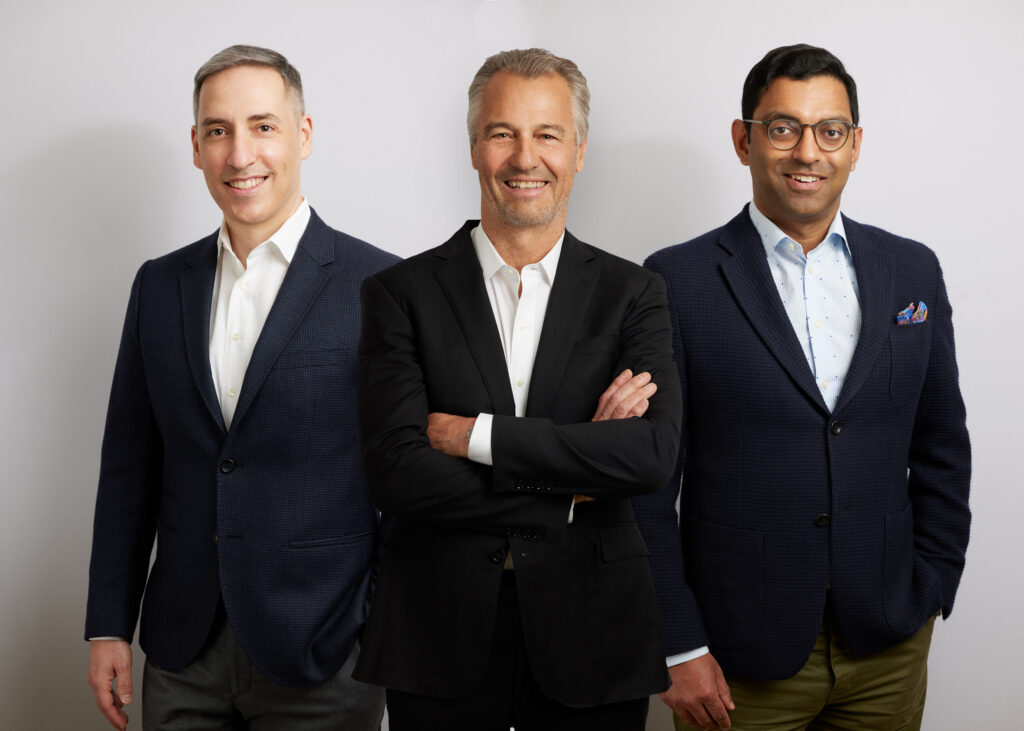
Toronto Hair Transplant Surgeons are internationally known for our pioneering work in hair transplantation.
Often our patients have the some of the same questions about hair loss – ranging from pregnancy to stress and even exercise , so we thought it would be best to collect them all in one place.
There’s a very good chance that you know a woman who ended up shedding more hair than usual in the first few months after giving birth. Hopefully, both you and her know this is completely normal.
The best news is that your hair should go back to normal within the first year of giving birth.
It all has to do with science!
Normally, about 85 to 95 percent of the hair on your head is growing and the other 5 to 15 percent is in whats called the resting stage. After the resting period this hair begins to fall out. It usually happens while your handling your locks, like while you’re brushing or shampooing, and those hairs are replaced with new growth.
An average woman sheds about 100 hairs a day.
During pregnancy, increased levels of estrogen prolong the growing stage (this is where the science comes in), and there are fewer hairs in the resting stage, which means fewer hairs are falling out each day. You have GORGEOUS hair during your pregnancy for this reason!
But you do pay for it later (kinda).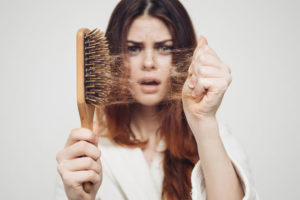
After you give birth, your estrogen levels take a nosedive and your hair follicles rapidly enter the resting stage. Almost immediately you’ll begin to notice your hair falling out at what you may consider an alarming rate.
But don’t stress it – the vast majority of women have a large amount of hair loss after their pregnancy. Your body is just balancing out and this unusual shedding will slow down and eventually stop within six to 12 months after you give birth.
It’s worth noting that not all women notice dramatic changes in their hair during pregnancy or the postpartum period. This issue usually tends to be a little more accelerated for women with long hair.
If you’re concerned about your hair loss postpartum, be sure to see your doctor.
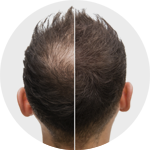
Toronto Hair Transplant Surgeons are internationally known for our pioneering hair transplantation work.
Our huge archive is here to help you see what we can do for you. Use the link below to view some sample cases.
Our bodies were meant to move — they actually crave exercise. Regular exercise is necessary for physical fitness and good health. It reduces the risk of heart disease, cancer, high blood pressure, diabetes and other diseases. It can improve your appearance and delay the aging process. But can too much exercise cause hair loss?

Exercise prevents disease, improves stamina, and strengthens and improves your muscles. It also allows you to enhance your flexibility and controls your weight, not to mention, it improves and helps you to maintain a good quality of life.
If excessive exercise includes the use of things like tight helmets/headgear or constant friction on the scalp – than perhaps there could be a correlation. Additionally, when using the term excessive – if hormones and nutritional deficits occur as a result of excessive stress on the body from training – there is a possibility it could impact hair loss. However, the use of anabolic steroids or other stimulants and chemicals used to enhance performance definitely have the possibility of creating negative side effects which might include hair loss or even unwanted hair growth in areas. But the exercise itself is unlikely to damage your hair follicles on its own.
The short answer to that question is yes.
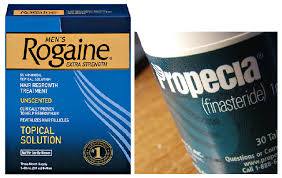
The more accurate answer is, for some people and to varying degrees.
The two main hair loss treatments currently available are finasteride and minoxidil, although you might know them better by their respective brand names – Propecia and Rogaine. Although they work in different ways, both have been clinically proven to help treat hair loss for men.
Let’s look at how each drug works and what the science behind them is.
Finasteride
Finasteride was first made commercially available in the late 90s and is seen by some men as a true miracle cure. The way finasteride works is that it inhibits the main hormone responsible for hair loss in men – dihydrotestosterone (DHT). By inhibiting DHT at a systemic level, it halts and in some cases, reverses hair loss.
Whilst finasteride is certainly effective for the majority of men (83% to be exact), it is most effective when used as a preventative treatment. That is to say – men who have complete hair loss cannot realistically expect to grow back a full head of hair. Those suffering from mild to moderate thinning at the crown can typically expect their hair loss to be slowed down and in some cases, regrowth.
Minoxidil
Minoxidil is significantly different to finasteride in that it’s marketed more as a regrowth treatment rather than a preventative measure.
Minoxidil works as a vasodilator, which essentially means it increases blood flow to the hair follicles and therefore encourages hair growth. Whilst minoxidil has been proven to be effective, the results do vary quite significantly. Because of this, many men will take both Minoxidil and Propecia to maximize the results they get from each treatment.
What about side effects?
Both minoxidil and finasteride can produce negative side effects for those taking them.
Side effects for minoxidil can include chest pain, irregular heartbeat, bloating and flushing.
Finasteride effects can include weak libido, loss of erections, fatigue, anxiety and depression. The seriousness and duration of finasteride side effects is a topic of fierce debate in the hair-loss community – some men believe that the drug is completely harmless whilst others believe it’s dangerous and causes permanent irreversible sexual side effects.
As is usual with these types of debates – Our experience at the Toronto Hair Transplant Surgeons is that these medications are well tolerated by most patients and we discuss the pros and cons of any medications on an individual basis with our patients.
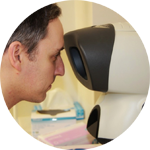
Familiarize yourself with our layout before you come in.
Visit the gallery to take a peek at our Oakville based clinic layout and surgical rooms.
A question that a lot of people who are suffering from hair loss would like the answer to is – will there ever be a permanent cure for hair loss? Given the advancements in technology and medicine over the last decade, it’s an almost certainty that there will be a permanent cure for hair loss. Given that, the more interesting questions are – when will we have it and what will it look like?
When will we have it?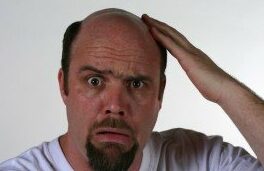
The hair loss industry is worth billions each year, when you take hair transplants and hair loss treatments into account. This being the case, a permanent cure for hair loss would be worth unimaginable amounts of money. Whenever there’s a lot of money to be made, you can sure that someone’s trying to figure out how to make it. This is a big part of the reason why research into hair loss has increased dramatically over the last 2 decades.
At one time, it was simply accepted that some men lose their hair and there’s nothing that can be done about it. Nowadays, as scientists have learned more about the biological reasons behind hair loss, the premise of a permanent cure looks much more likely. Whilst it’s impossible to predict exactly when a permanent and completely effective cure for hair loss will be on the market, it certainly doesn’t seem like a foreign notion when you consider the effective solutions that are available right now.
What will it look like?
It’s easy to assume that a permanent hair loss cure would come in the form of a pill, much like Propecia is now. However, one of the most promising avenues of hair loss research is hair cloning. Hair cloning is being researched in many different labs around the world. Hair cloning research has heavy investment into its possibilities as the most effective treatment for permanent hair loss treatment.
There are a lot of myths that persist around the subject of hair loss. A big part of the reason for this is that people generally don’t think about hair loss until they have to deal with it themselves. This means that myths get accepted as truth and the real facts get lost.
themselves. This means that myths get accepted as truth and the real facts get lost.
Something that a lot of people believe is that stress is major cause of hair loss – but is this really true? Well, the answer is – sometimes, but in most cases – no. When talking about classic male pattern balding, stress is usually not a factor. However, there is a particular type of hair loss known as telogen effluvium that can be triggered by very stressful events.
It’s worth pointing out that this type of hair loss is relatively rare, especially when compared to male pattern balding so in a general sense, no – stress is not what causes hair loss.
The main culprit of male pattern balding is the hormone dihydrotestosterone (DHT). DHT is produced naturally in the body, but for a good percentage of men, their DHT levels rise as they age and this in turn causes their hair to thin out. This is because hair follicles are very sensitive to DHT and its presence causes them to shrink and eventually die.
There are other factors that can contribute to the speed at which hair loss occurs, such as diet and lifestyle factors, but DHT is by far the biggest culprit in male balding.
Available treatments
Know you know what causes hair loss you’re probably curious as to whether anything can be done about it. The good news is that there are now treatments available that are proven to be effective in treating hair loss. The bad news is they don’t work for everybody and they do come with some potential side effects.
Below are the two FDA-approved treatments available for hair loss.
Does your hair health depend on what you eat? Can your diet and hair be connected? Though it may be tough to believe, experts agree that the cells that support a strong and healthy hair depends on a well balanced diet. A diet enriched with vital nutrients strengthens your hair follicle. Every hair strand originates from the hair follicle. When the follicle is nourished well, your hair glows with health. Some other health related factors that could impact your hair include your sleep and smoking habits, hormonal imbalances and other health issues like under or over active thyroid. So what do you need to eat to ensure healthy looking hair? What is the food group that you should include in your diet on an everyday basis? Let’s explore!
Can your diet and hair be connected? Though it may be tough to believe, experts agree that the cells that support a strong and healthy hair depends on a well balanced diet. A diet enriched with vital nutrients strengthens your hair follicle. Every hair strand originates from the hair follicle. When the follicle is nourished well, your hair glows with health. Some other health related factors that could impact your hair include your sleep and smoking habits, hormonal imbalances and other health issues like under or over active thyroid. So what do you need to eat to ensure healthy looking hair? What is the food group that you should include in your diet on an everyday basis? Let’s explore!
A well balanced diet that is adequate in protein is essential for cell functioning and cell repair activities in the body. Protein is a building block of your hair, for your hair is made of keratin which is basically a protein. Evidently, without the supply or availability of adequate levels of protein, your body will not be able to replace fallen hair that is a natural occurrence everyday. Lack of protein in your diet will make your hair to be dry, lifeless and brittle.
Seafood
Fish is rich in essential fatty acids (specifically, omega-3 fatty acids) which is key to strong hair.
omega-3 fatty acids) which is key to strong hair.
Salmon is great for your hair because it not only contains omega-3 fatty acids, but is also abundantly rich in protein and Vitamin D. Salmon is a great source of natural oils that keep your hair well nourished and healthy.
Eggs
Eggs make a perfect protein rich breakfast. Eggs are also a wonderful source of minerals such as iron, zinc and sulfur. Iron plays a role in promoting the health of hair follicles because it helps in delivering oxygen to the follicles.
Vegetarian and looking out for protein source? Think lentils!
Don’t worry if you are vegan or vegetarian. You still can get your protein from lentils! They also contain nutrients such as iron, zinc etc.,
Fresh greens and leafy vegetables
These are a great source of several vitamins that promote the health of hair follicles and keep the scalp healthy.
Poultry
Poultry foods are an abundant source of hair building proteins and nutrients.



TORONTO HAIR
TRANSPLANT CENTRE
435 Reynolds Street
Suite 206
Oakville, Ontario
Canada, L6J 3M5
Send Us a Quick Email
[email protected]
Call Us
Phone: 877-789-4247
Fax: (905)815-1745
Working Hours
Monday To Friday: 9AM – 4PM
Saturday and Sunday: Closed
NEED HELP BOOKING A CONSULT?




435 Reynolds Street, Suite 206,
Oakville, Ontario, Canada, L6J 3M5






435 Reynolds Street, Suite 206,
Oakville, Ontario, Canada, L6J 3M5
© 2001-2023 Toronto Hair Transplant Surgeons. All Rights Reserved. Designed by scaleup42.com